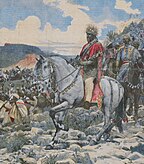
Back الحرب الإيطالية الإثيوبية الأولى Arabic Primer guerra ítalo-etíope AST Birinci İtaliya–Efiopiya müharibəsi Azerbaijani بیرینجی ایتالیا-حبشه ساواشی AZB Първа италианско-етиопска война Bulgarian Primera Guerra Italoetíop Catalan První italsko-etiopská válka Czech Første italiensk-abessinske krig Danish Italienisch-Äthiopischer Krieg (1895–1896) German Α΄ Ιταλο-Αβυσσηνιακός Πόλεμος Greek
| First Italo-Ethiopian War | |||||||||
|---|---|---|---|---|---|---|---|---|---|
| Part of the Scramble for Africa | |||||||||
| |||||||||
| Belligerents | |||||||||
|
|
| ||||||||
| Commanders and leaders | |||||||||
|
|
| ||||||||
| Strength | |||||||||
| 35,000[1]–43,700[2][3] | 80,000[4]–125,000[5] | ||||||||
| Casualties and losses | |||||||||
|
9,313 killed[a] 1,428 wounded[8] 3,865 captured[9][10] | ~10,000 killed[11] | ||||||||
The First Italo-Ethiopian War, also referred to as the First Italo-Abyssinian War, or simply in Italy as the Abyssinian War (Italian: Guerra d'Abissinia), was a war fought between Italy and Ethiopia from 1895 to 1896. It originated from the disputed Treaty of Wuchale, which the Italians claimed turned Ethiopia into an Italian protectorate. Full-scale war broke out in 1895, with Italian troops from Italian Eritrea achieving initial successes against Tigrayan warlords at Coatit, Senafe and Debra Ailà, until they were reinforced by a large Ethiopian army led by Emperor Menelik II.[12] The Italian defeat came about after the Battle of Adwa, where the Ethiopian army dealt the heavily outnumbered Italian soldiers and Eritrean askaris a decisive blow and forced their retreat back into Eritrea. The war concluded with the Treaty of Addis Ababa. Because this was one of the first decisive victories by African forces over a European colonial power,[13] this war became a preeminent symbol of pan-Africanism and secured Ethiopia's sovereignty until the Second Italo-Ethiopian War of 1935–36.[14]
- ^ Marcus, Harold G. (22 February 2002). A history of Ethiopia. University of California Press. p. 97. ISBN 9780520224797.
Baratieri had a relatively small army of 35,000 men, mostly Eritreans
- ^ Marcus, Harold G. The Life and Times of Menelik II: Ethiopia, 1844-1913. p. 168.
the general's army consisted of 29,700 Italians, 14,000 colonial soldiers, and 70 field pieces
- ^ Caulk, Richard (2002). "Between the Jaws of Hyenas": A Diplomatic History of Ethiopia (1876-1896). Harrassowitz Verlag, Wiesbaden. p. 506.
In all nearly 40,000 officers and men, 8,500 mules and 100,000 tons of material were scraped together for an expeditionary force
{{cite book}}: CS1 maint: location missing publisher (link) - ^ Henze 2000, p. 168.
- ^ Pankhurst 2001, p. 190
- ^ Dominioni, Matteo (2021). I prigionieri di Menelik, 1896-1897. Mimesis Edizioni. pp. Table 1.
{{cite book}}: CS1 maint: location missing publisher (link) - ^ Negash, Tekeste (1987). Italian Colonialism in Eritrea 1882-1941. p. 23.
- ^ Milkias, Paulos; Metaferia, Getachew (2005). The Battle of Adwa: Reflections on Ethiopia's Historic Victory Against. Algora. p. 286. ISBN 9780875864150.
- ^ Berkeley, George (1903). "The Campaign of Adowa and the rise of Menelik". The Geographical Journal. 21 (2): 345. Bibcode:1903GeogJ..21..175B. doi:10.2307/1775411. JSTOR 1775411.
1,865 were Italians and 2,000 were Eritrean askari.
- ^ Mclachlan, Sean (20 September 2011). Armies of the Adowa Campaign 1896. Bloomsbury USA. p. 20. ISBN 978-1-84908-457-4.
- ^ Vandervort 1998, p. 160
- ^ Henze 2000, p. 167.
- ^ "5 Fascinating Battles of the African Colonial Era". Encyclopaedia Britannica. Retrieved 14 June 2020.
- ^ Professor Kinfe Abraham, "The Impact of the Adowa Victory on The Pan-African and Pan-Black Anti-Colonial Struggle," Address delivered to The Institute of Ethiopian Studies, Addis Ababa University, 8 February 2006
Cite error: There are <ref group=lower-alpha> tags or {{efn}} templates on this page, but the references will not show without a {{reflist|group=lower-alpha}} template or {{notelist}} template (see the help page).
© MMXXIII Rich X Search. We shall prevail. All rights reserved. Rich X Search





